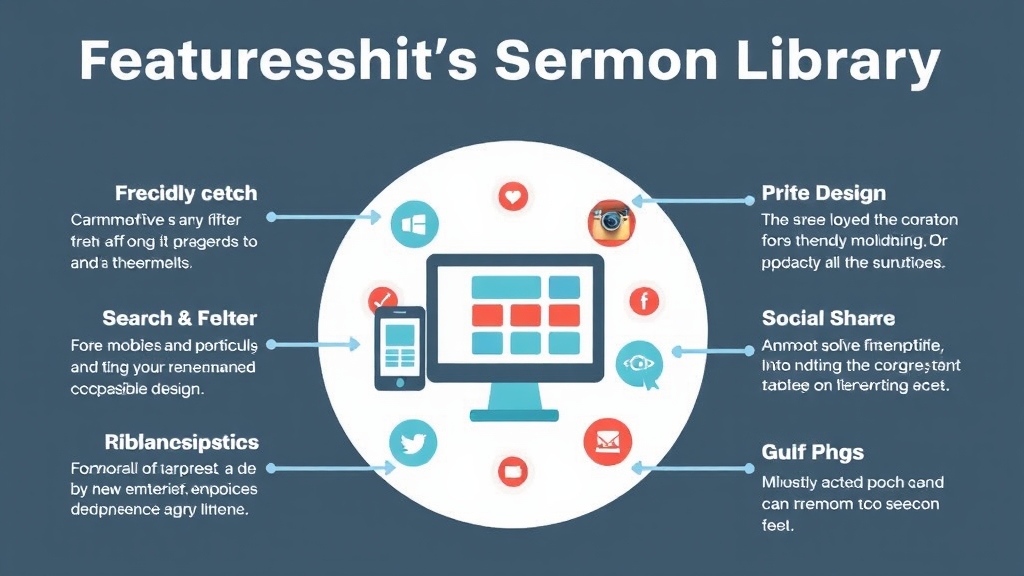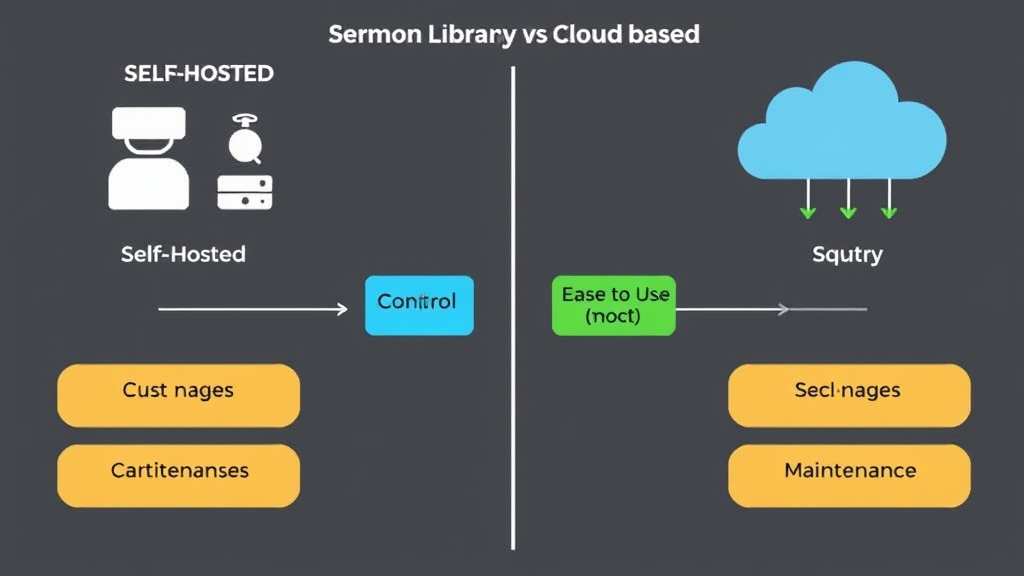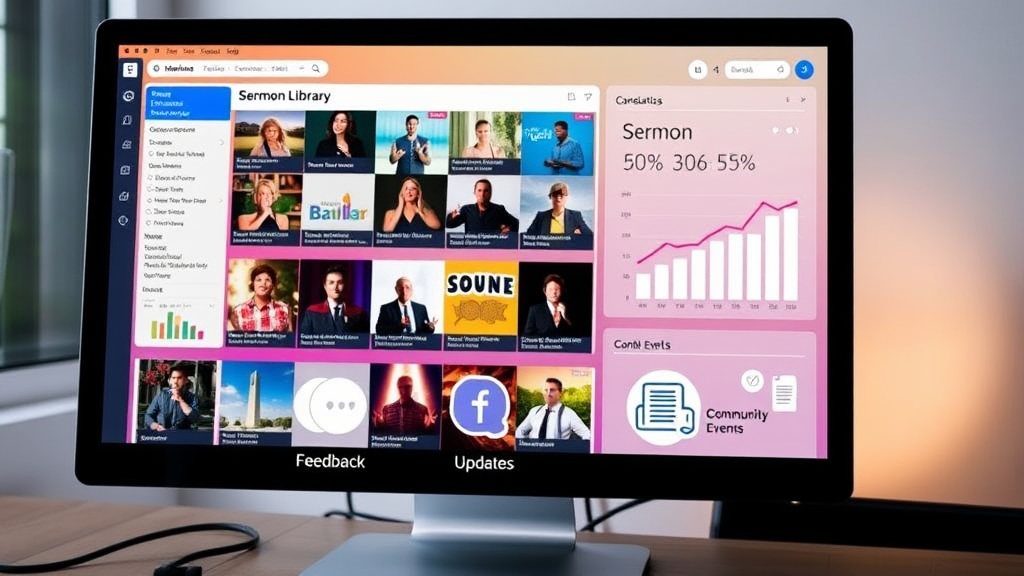Building an online sermon library for your congregation can significantly enhance spiritual engagement and outreach. By creating a digital platform that hosts sermons, you facilitate access to church teachings regardless of geographical barriers or individual circumstances. From enhancing visitor experiences to preserving spiritual history, a well-constructed sermon library serves multiple purposes that can greatly benefit your ministry.
Key Takeaways
- Definition: An online sermon library provides easy access to recorded sermons, improving engagement and outreach.
- Accessibility: Members can access sermons anytime, making it suitable for homebound individuals, travelers, and busy parents.
- Engagement Strategies: Use social media and email marketing to promote the library and keep the congregation connected.
- Technical Considerations: Choose the right platform for hosting sermons, with options ranging from self-hosted to cloud-based services.
- SEO Benefits: Regular updates to the sermon library can improve website visibility and engagement metrics.
Get started on your digital journey with ipsom.io.
Importance of an Online Sermon Library
An online sermon library is essential for fostering community and promoting spiritual growth among congregants. Here are some key points highlighting its significance:
Benefits of an Online Sermon Library
-
On-Demand Access:
- Provides congregants with the ability to engage with church teachings anytime.
- Allows individuals to listen to sermons at their convenience, accommodating busy schedules.
-
Support for Homebound Individuals:
- Vital for elderly or busy parents who may struggle to attend in-person services.
- Ensures that all members, regardless of circumstances, can participate in spiritual growth.
-
Preservation of Spiritual History:
-
Digitizing sermons creates a valuable resource for future reference.
-
Helps maintain the spiritual legacy of the congregation over time.
Engagement and Community Building
-
Enhancing New Member Engagement:
- Potential guests can sample sermon styles before attending.
- Offers insights into the church's teachings and community culture.
-
Retaining Existing Congregants:
- Current members can revisit key messages or catch up on missed sermons.
- Facilitates deeper understanding of the faith, enhancing their connection to the church.
Overall Impact
- Vibrant Congregation:
- Increased engagement fosters a more dynamic church community.
- Supports spiritual growth across all demographics, contributing to a healthier and more active congregation.
Features of an Effective Sermon Library
An effective sermon library is designed to enhance user experience and increase accessibility. Key features ensure that congregants can easily find, interact with, and benefit from sermon content. A well-structured library encourages deeper engagement and keeps users returning for more.
User-Friendliness
Interface design is vital for ensuring easy navigation. A user-friendly interface minimizes the time spent searching for sermons. Incorporating multimedia integration allows for a richer experience. By offering audio, video, and text options, you cater to different learning styles, ensuring that users can engage with the content in a way that suits them best.
Search and Filter Functionality
Having robust search and filter functionality is essential. Users should be able to locate sermons quickly by filtering through topics, dates, or speakers. According to studies, streamlined navigation can increase user satisfaction by up to 70%. This feature not only improves the user experience but also enhances engagement by allowing congregants to find relevant content easily.
Mobile Compatibility
Mobile compatibility is crucial in today's digital landscape. With over 50% of internet traffic coming from mobile devices, your sermon library must function smoothly on smartphones and tablets. Ensuring mobile access allows congregants to engage with your content anywhere and anytime. A mobile-optimized experience significantly increases the chances of sharing sermons and recommending the library to others.
Social Sharing Options
Social sharing options are indispensable for expanding your library's reach. By enabling users to share sermons across various social platforms, you encourage organic promotion of your ministry. Data shows that content shared on social media is up to 75% more likely to garner engagement. Making it easy to share sermons increases visibility and helps attract new visitors to your congregation's teachings.
Choosing the Right Platform
Selecting the right platform for your digital sermon library is a critical step in ensuring its success. You need to evaluate whether a self-hosted or cloud-based solution best fits your church’s needs. A self-hosted option provides greater control and customization, but it also requires more technical skills and ongoing maintenance. In contrast, cloud-based solutions offer ease of use and scalability, often at a higher recurring cost. An assessment of security, budget, and maintenance capabilities should guide your decision.
Cost Assessment
When measuring the cost of the platform, it’s essential to balance your budget and features. Basic options are often more affordable but may lack advanced functionalities like robust analytics or multimedia support. Consider premium services that might be more expensive upfront but offer long-term value through better performance and support. Many cloud options provide tiered pricing plans that can accommodate a variety of budgets, making it essential to evaluate what features you truly need to serve your congregation effectively.
Customization and Scalability
As your library grows, it's important to choose a platform that allows for customization and scalability. This flexibility ensures your library can adapt to evolving needs without requiring a complete redesign. Look for platforms that support custom themes, additional plugins, and integrations that can expand functionality over time. Your chosen platform should serve your current requirements while also being able to grow alongside your congregation's engagement and content offerings.
Best Practices for Managing a Digital Sermon Library
Managing a digital sermon library requires ongoing attention and strategy. Implementing best practices will ensure that your library remains engaging, relevant, and accessible to your congregation. Here are key practices to consider:
Regular Content Updates
To retain interest and engagement, it is essential to keep your content fresh. Regularly uploading new sermons, devotional materials, or related content encourages users to return frequently. An effective schedule could involve weekly or bi-weekly updates, depending on your congregation's needs. Utilizing seasonal themes or specific series topics can create anticipation for future content, enriching the spiritual experience of your members.
User Engagement
Building a community around your sermon library is vital for its success. Solicit feedback from users to understand their preferences and areas for improvement. Consider creating discussion forums or comment sections under each sermon, where congregants can engage in dialogue. Host virtual events like Q&A sessions or live discussions to foster a deeper connection among members. This sense of community enhances user experience and encourages more frequent engagement with your content.
Utilizing Analytics
Tracking your sermon library's performance through analytics is crucial. Use tools like Google Analytics to monitor which sermons receive the most views and engagement. Tools can show you patterns in user behavior, such as peak traffic times and popular sermon topics. This data can inform your content strategy moving forward, guiding future sermon selections and promotional efforts. Adjust your offerings based on these insights to continuously meet the spiritual needs of your congregation.
Promotion Strategies
Effective promotion of your digital sermon library is essential for maximizing its reach and impact. Utilizing various marketing channels will keep your congregation informed and engaged with valuable content. Implementing strategies like:
- Social Media Utilization
- Email Marketing Campaigns
- Collaboration with Other Ministries
will create a dynamic environment for spiritual growth.
Social Media Utilization
- Engagement through Social Media Platforms: Promoting your sermon library ensures consistent interaction with your congregation.
- Content Sharing:
- Share sermon highlights and quotes.
- Use engaging visuals to attract attention.
- Platforms to Leverage: Focus on:
- Measure Success: Track engagement via likes, shares, and comments to foster a sense of community around your church's teachings.
Email Marketing Campaigns
- Personalized Outreach: An effective email marketing strategy allows for tailored communication with your congregation.
- Newsletter Features:
- Include calls to action to promote new content.
- Highlight upcoming sermons.
- Clickable Links: Encourage congregation members to access sermon recordings easily.
- Feedback Encouragement: Invite feedback to enhance engagement.
- Engagement Rates: Well-planned campaigns can achieve higher engagement rates, with average open rates for nonprofit organizations ranging between 20-30%.
Collaboration with Other Ministries
- Partnership Opportunities: Forming partnerships with other ministries or local churches can enhance your library's visibility.
- Joint Initiatives:
- Organize events and workshops.
- Engage in resource sharing.
- Content Sharing Benefits: Collaborations can expand sermon reach and provide fresh perspectives to your audience.
- Community Unity: This approach fosters a sense of unity within the community and promotes spiritual growth across congregations.
Implementing Your Digital Sermon Library
Creating a digital sermon library requires careful planning and execution. Start with a platform that best suits your church's needs. WordPress is an excellent choice for many churches, offering flexibility and a vast array of plugins specifically designed to manage sermon content effectively.
WordPress for Churches
Using WordPress allows churches to leverage popular plugins to build and manage their sermon libraries easily. These plugins facilitate the organization and display of sermons, making them accessible to your congregation. Additionally, they offer customization options that can enhance user experience. Utilizing WordPress will enable you to create a library that is both functional and visually appealing.
Essential Pages on Website
To optimize visitor experience, include essential pages alongside your sermon section. These should feature content like "Plan Your Visit" and "Our Beliefs." This structure not only helps new visitors navigate your site but also provides essential information about your church's mission and services. A well-organized website enhances engagement and ensures that users can readily find the sermons and resources they seek.
Popular Plugins for Sermon Management
Choosing the right plugins is essential for building an effective digital sermon library. Several options cater to different needs, from organization to membership management. Utilizing these plugins can enhance user experience and make sermon access more efficient.
Overview of Available Options
-
Series Engine: This plugin is a comprehensive tool specifically designed for organizing sermon series. It simplifies the management of sermons, series, and speakers, allowing you to present content in an orderly fashion. Its robust features ensure sermons are displayed attractively and logically.
-
CP Sermons: This is a monthly subscription option that provides ongoing updates. It features customizable templates for sermon presentation, making it easier for congregants to find and engage with the content they are looking for. The regular updates ensure that you have access to the latest tools for sermon management.
-
Advanced Sermons: This plugin offers basic features for free while charging an annual fee for advanced options. It's suitable for churches that want to start without upfront costs and later upgrade as their needs grow. The plugin is user-friendly and supports various media formats for sermons.
Adding Audio and Video Content
Incorporating audio and video content can significantly enrich the user experience. Consider options like Seriously Simple Podcasting for audio content management. It allows you to effectively manage and distribute audio sermons, making them accessible on various podcast platforms. Video plugins can also be integrated to host livestreams or pre-recorded sermons, offering more engagement opportunities.
By selecting appropriate plugins and tools, you can vastly improve the functionality and accessibility of your sermon library. Each plugin serves a unique purpose, so choose those that align with your church's objectives and audience needs. For more tools and advice on enhancing your sermon library, check out offerings at ipsom.io.
<img src="https://ipsom.io/wp-content/uploads/2024/12/0.16669045171788865A-visually-appe.jpg" alt="A visually appealing infographic displays popular plugins for sermon management. It highlights "Series Engine," "CP Sermons," and "Advanced Sermons" with icons representing organization, templates, and media support. The background features audio and video symbols, indicating enhanced user engagement through content integration. A header reads "Enhance Your Digital Sermon Library" at the top.">
Storage and Security Considerations
When building a digital sermon library, storage and security are crucial elements. Unlimited storage options are available through various cloud services, making it affordable to host extensive sermon collections. This ensures that you can upload all your content without worrying about space constraints. Many cloud solutions offer plans that cater specifically to churches and ministries, allowing them to manage their digital assets effectively.
Backup and safety are also pivotal for your sermon library. Regular backups to secure cloud storage protect your valuable content from loss or corruption. Implementing a routine backup strategy helps safeguard the integrity of your sermons, ensuring they are always accessible to your congregation. Additionally, consider using services that provide automatic backups to streamline this process and minimize risks. By taking these precautions, your sermon library will not only be functional but also secure and reliable for all users.
Encouragement for Implementation
Start with a small-scale approach when building your digital sermon library. Focus on launching essential content like key sermons or foundational teachings. Gradually expand by adding features and more extensive content based on user feedback and engagement metrics. This method reduces initial pressure and helps in systematically enhancing the library.
Active promotion is critical for success. Regularly inform congregation members about new content and features. Send out monthly newsletters detailing updates and new sermons. Utilize social media platforms to share sermon snippets or highlights, encouraging congregants to explore the library further. Keeping your audience engaged fuels interest and promotes consistent utilization of the resource.
SEO Benefits of a Digital Sermon Library
A digital sermon library not only enriches your congregation but also significantly enhances your online visibility. Regularly updating this library with fresh content can boost your website's performance and improve its search engine ranking. Search engines favor websites that consistently add new and relevant information, making an online sermon library a valuable asset for your ministry.
Enhancing Online Visibility
Fresh content is vital for effective SEO. By frequently updating the sermon library, you encourage search engines to crawl your site more often, which can result in higher visibility. Additionally, incorporating transcriptions of your sermons is beneficial. Transcribing audio or video makes your content more accessible and indexable to search engines, thus improving discoverability.
Encouraging Biblical Literacy and Engagement
Including scripture references in your sermon descriptions not only enriches the content but also supports users' biblical learning. This practice can increase engagement, as members search for specific teachings or related topics. Building your content around searchable terms increases the likelihood of attracting new visitors who may discover your church through query-based searches.
Personalized and Detailed Sermon Landing Pages
Creating dedicated landing pages for each sermon enhances user experience and SEO. Each page should have a unique URL and detailed descriptions, including the sermon title, date, and key themes. This structure not only aids in organization but also helps search engines index your sermons more effectively. By improving site hierarchy, visitors can easily navigate through past sermons, thereby prolonging their engagement with your content and increasing the chances of conversion into active congregation members.
FAQ
What is a digital sermon library?
- A digital sermon library is an online platform for storing and organizing recorded sermons.
- Allows congregants to access sermons anytime and from anywhere.
- Facilitates spiritual growth and provides a convenient way to revisit teachings and messages.
How can an online sermon library benefit my congregation?
- Enhances congregational engagement with easy access to sermons.
- Helps homebound members access teachings.
- Attracts new visitors and retains current members by offering valuable content.
- Serves as a historical archive, preserving spiritual teachings for future generations.
What features should I look for in sermon library software?
Key features to consider:
- User-friendly design for easy navigation.
- Search and filter functionality to quickly find specific sermons.
- Mobile compatibility for access on various devices.
- Support for multimedia content, including audio and video.
- Social sharing options to expand reach and facilitate easier access to sermons.
Which platforms are best suited for building a sermon library?
- WordPress: Flexible and can use dedicated sermon management plugins.
- Libsyn and Podbean: Cloud-based services for robust audio and video hosting.
- Choose a platform based on your church's specific needs, budget, and technical capabilities.
Is it necessary to transcribe sermons, and how can it help?
- Transcribing sermons is not mandatory but highly beneficial.
- Improves accessibility for hearing-impaired users.
- Enhances SEO, making content more discoverable to search engines.
- Allows for better resource searching and serves as material for study and reference.
What are cost-effective options to build a sermon library?
- Self-hosted solutions using open-source software like WordPress.
- Consider plugins that provide affordable pricing options or services offering free trials.
- Assess your budget while ensuring essential features are included.
How do I keep the sermon library updated and engaging?
- Regular content updates are key:
- Schedule new sermons monthly or bi-weekly.
- Encourage congregant engagement through feedback or discussion opportunities.
- Utilize email newsletters and social media to announce new content and keep the community informed.
How can I promote my sermon library effectively?
- Promote through social media channels by sharing highlights and updates regularly.
- Use email marketing campaigns to reach existing members with personalized messages.
- Collaborate with other ministries for joint events to expand reach and effectiveness.
What plugins can enhance the sermon management process?
Useful plugins include:
- Series Engine: For organizing sermon series.
- CP Sermons: For monthly updates.
- Seriously Simple Podcasting: Great for managing audio content.
- Research additional options to find the best fit for your church’s specific needs.
How does SEO impact the reach of my sermon library?
- SEO plays a critical role in increasing the visibility of your sermon library.
- Regular updates and use of transcriptions improve discoverability.
- Unique landing pages for each sermon attract more visitors.
- Enhanced SEO encourages biblical literacy as users explore valuable content through search.





